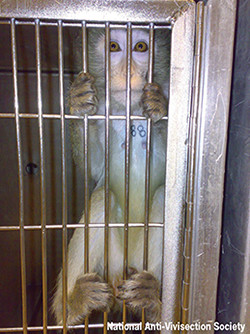 In the countdown to World Day for Laboratory Animals on 24 April, the National Anti-Vivisection Society (NAVS) has released shocking details of primate experiments and their failure. The animal suffering in the experiments is clear and NAVS, the world’s oldest anti-vivisection organisation, describes them as “unreliable, unethical, unnecessary.”
In the countdown to World Day for Laboratory Animals on 24 April, the National Anti-Vivisection Society (NAVS) has released shocking details of primate experiments and their failure. The animal suffering in the experiments is clear and NAVS, the world’s oldest anti-vivisection organisation, describes them as “unreliable, unethical, unnecessary.”
Around 6,000 primates are used in European laboratories each year, 2,466 in the UK. Over half are subjected to a barrage of regulatory safety tests. Our closest relatives in the animal kingdom are restrained, force-fed and injected with drugs and other substances to measure their toxic effects. Despite advanced alternatives like microdosing, which enable more accurate earlier study, many of these tests continue to be driven by outdated regulations. The NAVS reveals:
• A vaginal gel tested on female monkeys – despite a similar product being examined in women.
• Monkeys being electrically masturbated during tests of a cancer drug.
• Bolts and chambers screwed into the heads of monkeys.
• The gums of monkeys cut into and cavities created in teeth to test dental filling materials – the researchers noted that the inflammation process was different in humans.
• Monkeys suffering fever, lethargy and severe damage to the liver, spleen and lungs after being forced to inhale bacteria by the Ministry of Defence.
National Anti-Vivisection Society Campaigns Director Tim Phillips says: “Thousands of primates are subjected to horrific experiments in the UK and Europe each year. It is to our shame that we continue to use our closest relatives in tests where there are technologically advanced, humane methods available that give reliable human-based data. It is almost a decade since the European Parliament called on the European Commission to set a timetable to replace these tests, yet there has been little progress.”
Almost ten years ago, in 2007, Members of the European Parliament instructed (in Written Declaration WD40/2007) the European Commission to set a timetable to phase out experiments on monkeys. Sadly little progress has been made.
Aside from the ethical considerations, there are fundamental differences at the cellular, genetic and immune system level, making data from primate tests unreliable for humans – as shown in the cases of TGN1412 and BIA 10-2474. Outcomes can also be affected by factors including stress and the animal’s age, diet and sex.
In the coming week, as the suffering of laboratory animals is marked all over the globe on World Day for the Laboratory Animals, the NAVS is calling for action to end cruel experiments on monkeys.
Find out more: worlddayforlaboratoryanimals.org






